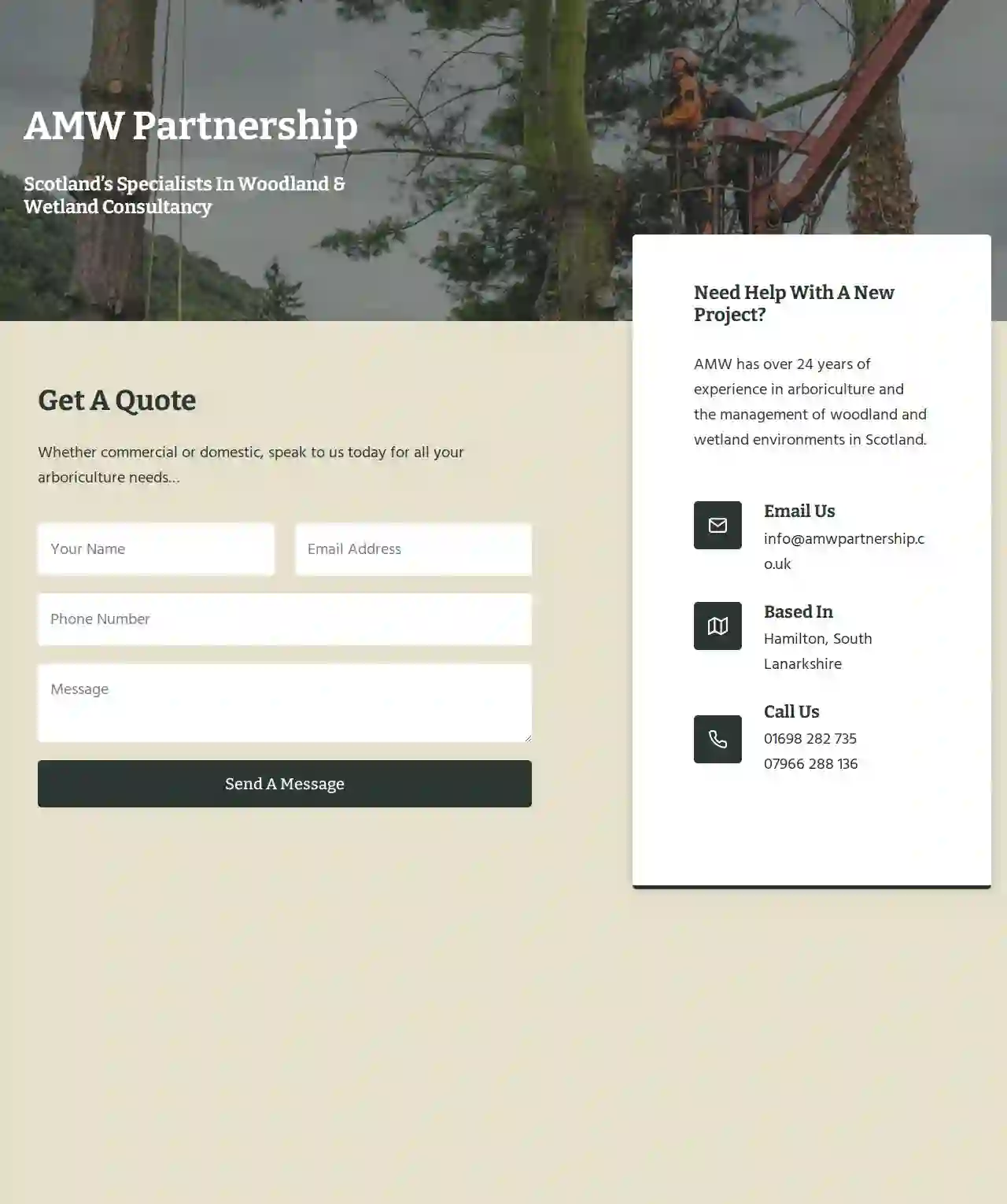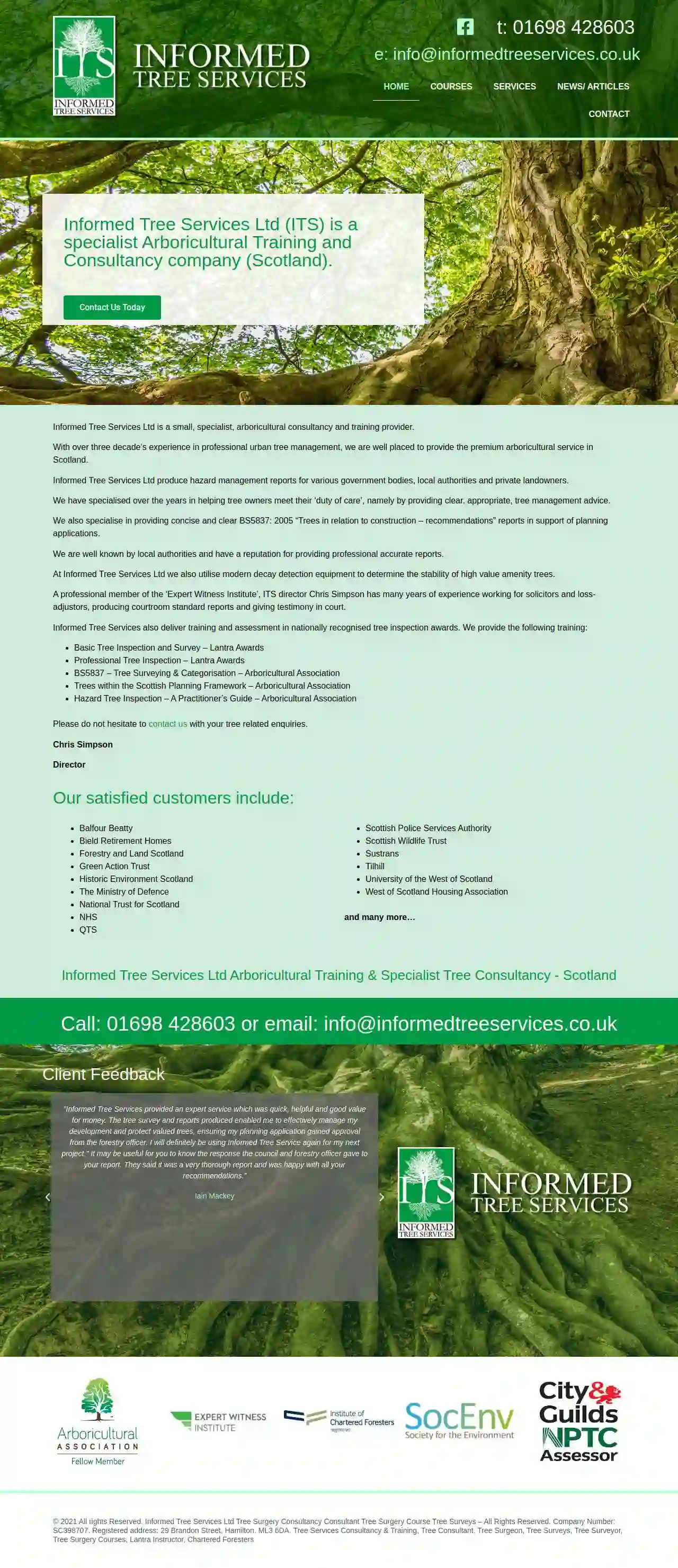Tree Surgeon Lesmahagow
Top 10 Tree Surgery in Lesmahagow
Receive multiple Tree Surgery quotes for your project today! Compare profiles, reviews, accreditations, portfolio, etc... and choose the best deal.

AMW Tree Services
Unit 1, 100 Quarry Street, Hamilton, ML3 0AA, GBAMW Partnership is Scotland’s specialists in Woodland & Wetland consultancy. We have over 24 years of experience in arboriculture and the management of woodland and wetland environments in Scotland. Whether commercial or domestic, speak to us today for all your arboriculture needs.
- Services
- Why Us?
Get Quote
Hamilton's Trees & Gardens
516 reviewsHamilton, GBHamilton's Trees & Gardens is a local business dedicated to providing top-notch tree and garden services. We are currently working on a brand new website, but in the meantime, please don't hesitate to get in touch if you have any questions or need our services.
- Services
- Why Us?
- Gallery
Get Quote
Informed Tree Services
55 reviews29 Brandon Street, Hamilton, GBInformed Tree Services Ltd is a specialist Arboricultural Training and Consultancy company (Scotland). With over three decades of experience in professional urban tree management, we are well placed to provide the premium arboricultural service in Scotland. We produce hazard management reports for various government bodies, local authorities and private landowners. We have specialized over the years in helping tree owners meet their 'duty of care', namely by providing clear, appropriate, tree management advice. We also specialize in providing concise and clear BS5837: 2005 'Trees in relation to construction - recommendations' reports in support of planning applications. We are well known by local authorities and have a reputation for providing professional accurate reports. At Informed Tree Services Ltd, we also utilize modern decay detection equipment to determine the stability of high value amenity trees. A professional member of the 'Expert Witness Institute', ITS director Chris Simpson has many years of experience working for solicitors and loss-adjustors, producing courtroom standard reports and giving testimony in court. Informed Tree Services also deliver training and assessment in nationally recognized tree inspection awards.
- Services
- Why Us?
- Accreditations
- Our Team
- Testimonials
- Gallery
Get Quote- J
J Henderson landscaping & tree services
Hamilton, GB- Services
- Why Us?
Get Quote - BR
BRADSHAW HAMILTON
54 reviewsHamilton, GB- Services
- Why Us?
Get Quote - Da
David Hamilton
53 reviewsHamilton, GB- Services
- Why Us?
Get Quote
Over 6,989+ Arborists on our platform
Our tree care contractors operate in Lesmahagow and surrounding areas!
LocalTreeSurgeon has curated and vetted the Best Arborists in Lesmahagow. Find a reliable contractor today.
Frequently Asked Questions About Tree Services
- Experience and qualifications: 'How long have you been in business? Are your arborists certified? What experience do you have with similar projects?'
- Licensing and insurance: 'Are you licensed and insured? Can you provide proof of insurance?'
- Safety practices: 'What safety measures do you take to protect your workers and my property during the project?'
- Cleanup and disposal: 'What will you do with the tree debris after the job? Will you remove the stump and clean up the work area?'
- References: 'Can you provide references from previous clients?'
- Written estimates: 'Can you provide a detailed written estimate outlining the scope of work, costs, and timeframe?'
- 10 feet away from foundations for small trees (mature height under 30 feet).
- 20 feet away from foundations for medium-sized trees (mature height 30-70 feet).
- 30 feet or more away from foundations for large trees (mature height over 70 feet).
- Shallow Soil: In areas with thin or compacted soil, roots may not be able to penetrate deeply and instead grow near the surface.
- Soil Compaction: Heavy foot traffic, construction activities, or vehicles can compact the soil, making it difficult for roots to grow downward.
- Low Oxygen Levels: Roots need oxygen to survive, and in poorly drained or compacted soil, they may grow near the surface to access more oxygen.
- Seeking Nutrients: Roots may grow towards areas with higher nutrient concentrations, which can be near the surface in some cases.
- Tree Species: Some tree species are naturally prone to surface roots, such as maples, willows, and poplars.
- Age: As trees age, their root systems expand, and some roots may naturally grow closer to the surface.
- Communication: The first step is to talk to your neighbor and explain the issue. They may be willing to trim the roots or remove the tree if it's causing damage.
- Root Pruning: You can cut back the roots at the property line, but it's essential to do this carefully to avoid damaging the tree. Consult with a certified arborist for guidance on proper root pruning techniques.
- Root Barrier Installation: Installing a physical barrier, such as a thick plastic sheet or metal edging, can prevent roots from growing into your yard. The barrier should be at least 2 feet deep and extend several feet from the trunk.
- Chemical Control (Not Recommended): Chemical root killers are available, but they are generally not recommended due to potential environmental damage and the risk of harming the tree.
What questions should I ask a tree service company?
How close to a house can you plant a tree?
Why do tree roots grow above ground?
How do I stop my neighbor's tree roots from growing into my yard?
What questions should I ask a tree service company?
- Experience and qualifications: 'How long have you been in business? Are your arborists certified? What experience do you have with similar projects?'
- Licensing and insurance: 'Are you licensed and insured? Can you provide proof of insurance?'
- Safety practices: 'What safety measures do you take to protect your workers and my property during the project?'
- Cleanup and disposal: 'What will you do with the tree debris after the job? Will you remove the stump and clean up the work area?'
- References: 'Can you provide references from previous clients?'
- Written estimates: 'Can you provide a detailed written estimate outlining the scope of work, costs, and timeframe?'
How close to a house can you plant a tree?
- 10 feet away from foundations for small trees (mature height under 30 feet).
- 20 feet away from foundations for medium-sized trees (mature height 30-70 feet).
- 30 feet or more away from foundations for large trees (mature height over 70 feet).
Why do tree roots grow above ground?
- Shallow Soil: In areas with thin or compacted soil, roots may not be able to penetrate deeply and instead grow near the surface.
- Soil Compaction: Heavy foot traffic, construction activities, or vehicles can compact the soil, making it difficult for roots to grow downward.
- Low Oxygen Levels: Roots need oxygen to survive, and in poorly drained or compacted soil, they may grow near the surface to access more oxygen.
- Seeking Nutrients: Roots may grow towards areas with higher nutrient concentrations, which can be near the surface in some cases.
- Tree Species: Some tree species are naturally prone to surface roots, such as maples, willows, and poplars.
- Age: As trees age, their root systems expand, and some roots may naturally grow closer to the surface.
How do I stop my neighbor's tree roots from growing into my yard?
- Communication: The first step is to talk to your neighbor and explain the issue. They may be willing to trim the roots or remove the tree if it's causing damage.
- Root Pruning: You can cut back the roots at the property line, but it's essential to do this carefully to avoid damaging the tree. Consult with a certified arborist for guidance on proper root pruning techniques.
- Root Barrier Installation: Installing a physical barrier, such as a thick plastic sheet or metal edging, can prevent roots from growing into your yard. The barrier should be at least 2 feet deep and extend several feet from the trunk.
- Chemical Control (Not Recommended): Chemical root killers are available, but they are generally not recommended due to potential environmental damage and the risk of harming the tree.